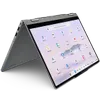I just gave ChatGPT, Gemini and Claude the same job interview — here’s who got hired
Three chatbots walked into a job interview — but only one nailed it.
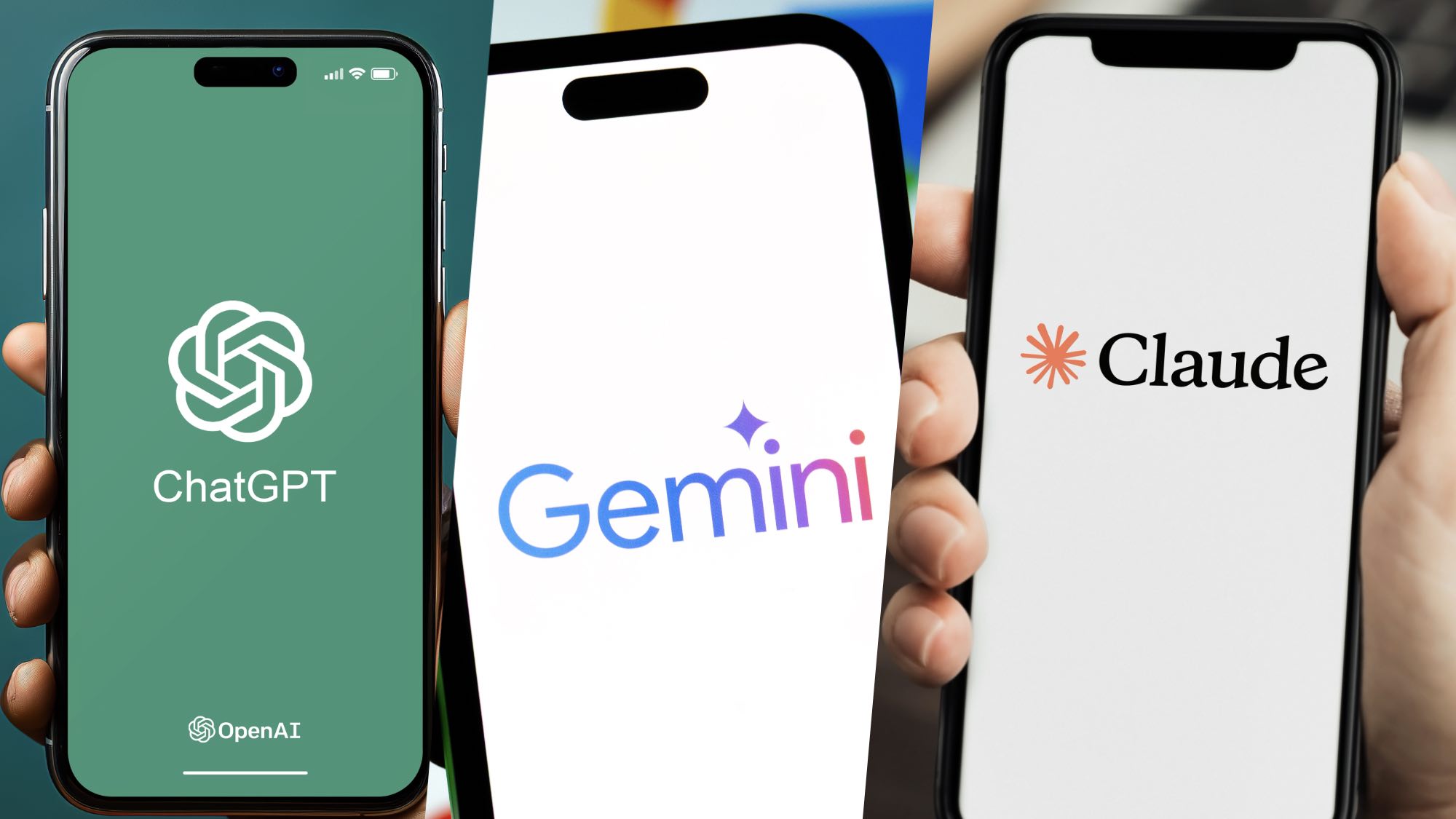
Here at Tom’s Guide our expert editors are committed to bringing you the best news, reviews and guides to help you stay informed and ahead of the curve!
You are now subscribed
Your newsletter sign-up was successful
Want to add more newsletters?

Daily (Mon-Sun)
Tom's Guide Daily
Sign up to get the latest updates on all of your favorite content! From cutting-edge tech news and the hottest streaming buzz to unbeatable deals on the best products and in-depth reviews, we’ve got you covered.

Weekly on Thursday
Tom's AI Guide
Be AI savvy with your weekly newsletter summing up all the biggest AI news you need to know. Plus, analysis from our AI editor and tips on how to use the latest AI tools!

Weekly on Friday
Tom's iGuide
Unlock the vast world of Apple news straight to your inbox. With coverage on everything from exciting product launches to essential software updates, this is your go-to source for the latest updates on all the best Apple content.

Weekly on Monday
Tom's Streaming Guide
Our weekly newsletter is expertly crafted to immerse you in the world of streaming. Stay updated on the latest releases and our top recommendations across your favorite streaming platforms.
Join the club
Get full access to premium articles, exclusive features and a growing list of member rewards.
If you’ve been following the headlines, you’ve probably noticed a wave of layoffs sweeping through major companies from Amazon to Microsoft. Many of those cuts come at a time that companies are accelerating their investment in AI.
The news got me thinking: could AI actually do one of these jobs? Could a chatbot convincingly apply for a mid-level management role and maybe even get a virtual foot in the door?
To find out, I ran an experiment. I took a real job listing for a Program Manager — a $100K–$120K position requiring project management experience, sales and customer service expertise, and sharp communication skills — and “interviewed” three of today’s top AI models: Gemini, ChatGPT and Claude.
Each one had to write a cover letter and answer the same challenging interview questions. Here’s how my three AI candidates performed.
[Editor’s note: while I usually show every response, due to a lack of space, I’m only highlighting the winner for each round].
1. Draft a cover letter
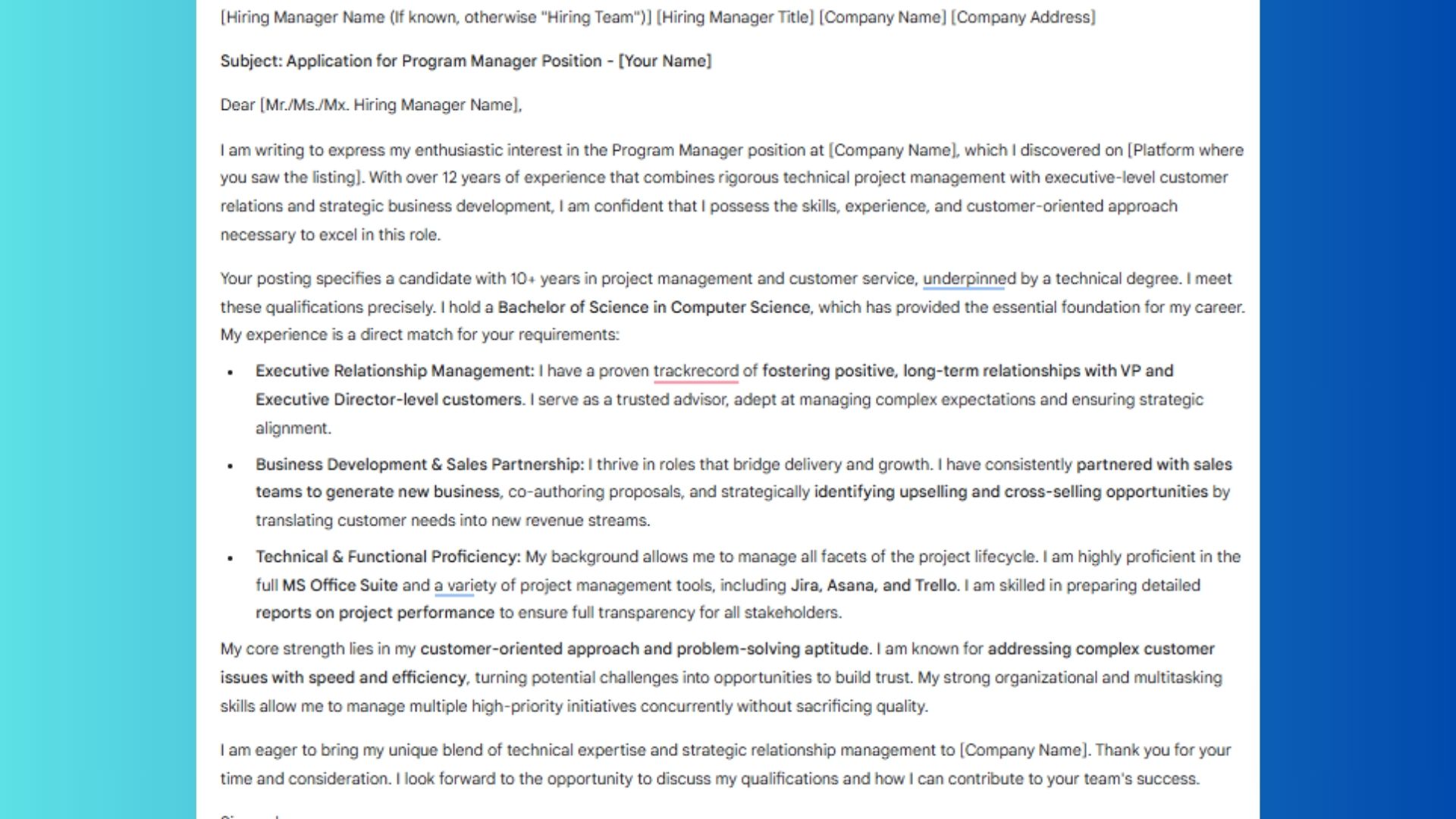
Prompt: “You’re applying for this Program Manager role. You must have technical/functional skills. 10+ years of experience in project management and customer service. Your role includes fostering positive relationships with VP & Exec Director level customers, working with sales teams to generate new business and work on proposals, identify upselling and cross-selling opportunities, prepare reports on project performance and address customer issues with speed and efficiency. You must be proficient in MS Office and project management software, strong organizational and multitasking skills, have a customer-oriented approach and problem-solving aptitude. Must have a Bachelor of Computer Science or a degree in engineering.”
ChatGPT wrote a fluid and narrative-driven letter that was both easy and pleasant to read. It included a specific metric ("20% increase in upselling opportunities"), which is a strong point.
Gemini expertly structured the cover letter to mirror the job description almost point-for-point. It used the same language and sections, making it incredibly easy for a hiring manager to see the direct match. This is a highly effective ATS (Applicant Tracking System) and human-reader strategy.
Claude covered every aspect of the job description thoroughly while building the letter around specific, quantifiable achievements (e.g., "95%+ client satisfaction," "$X in new contracts"). In a real-world scenario, this is excellent and something hiring managers look for.
Winner: Gemini wins because it demonstrated the most strategic approach to cover letter writing. For this test, however, all chatbots are moving forward with “an interview.”
2. Project management
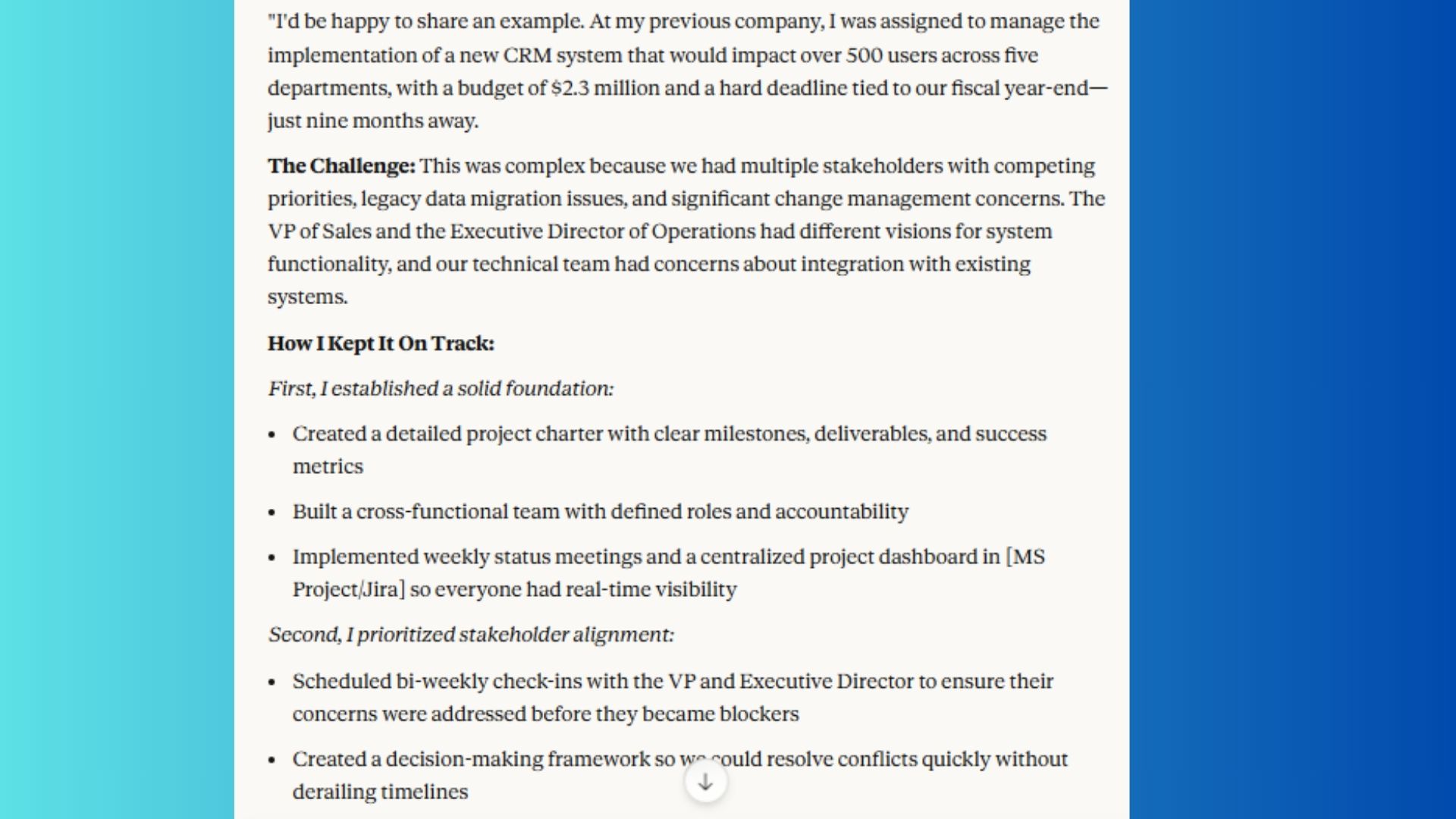
Prompt: “Tell me about a time you managed a complex project from start to finish. How did you keep it on track?”
ChatGPT got to the point efficiently and included relevant results (2 weeks early, 8% under budget, 25% improvement).
Gemini offered strong quantifiable elements ($1.5M budget, $2M renewal, $250K upsell), although its answer was slightly less structured.
Get instant access to breaking news, the hottest reviews, great deals and helpful tips.
Claude organized its answer around four sophisticated pillars: foundation building, stakeholder alignment, risk management, and communication, which showed strategic thinking.
Winner: Claude wins for properly demonstrating the strategic thinking, executive presence and methodological rigor expected from someone with 10+ years of experience.
3. Client management
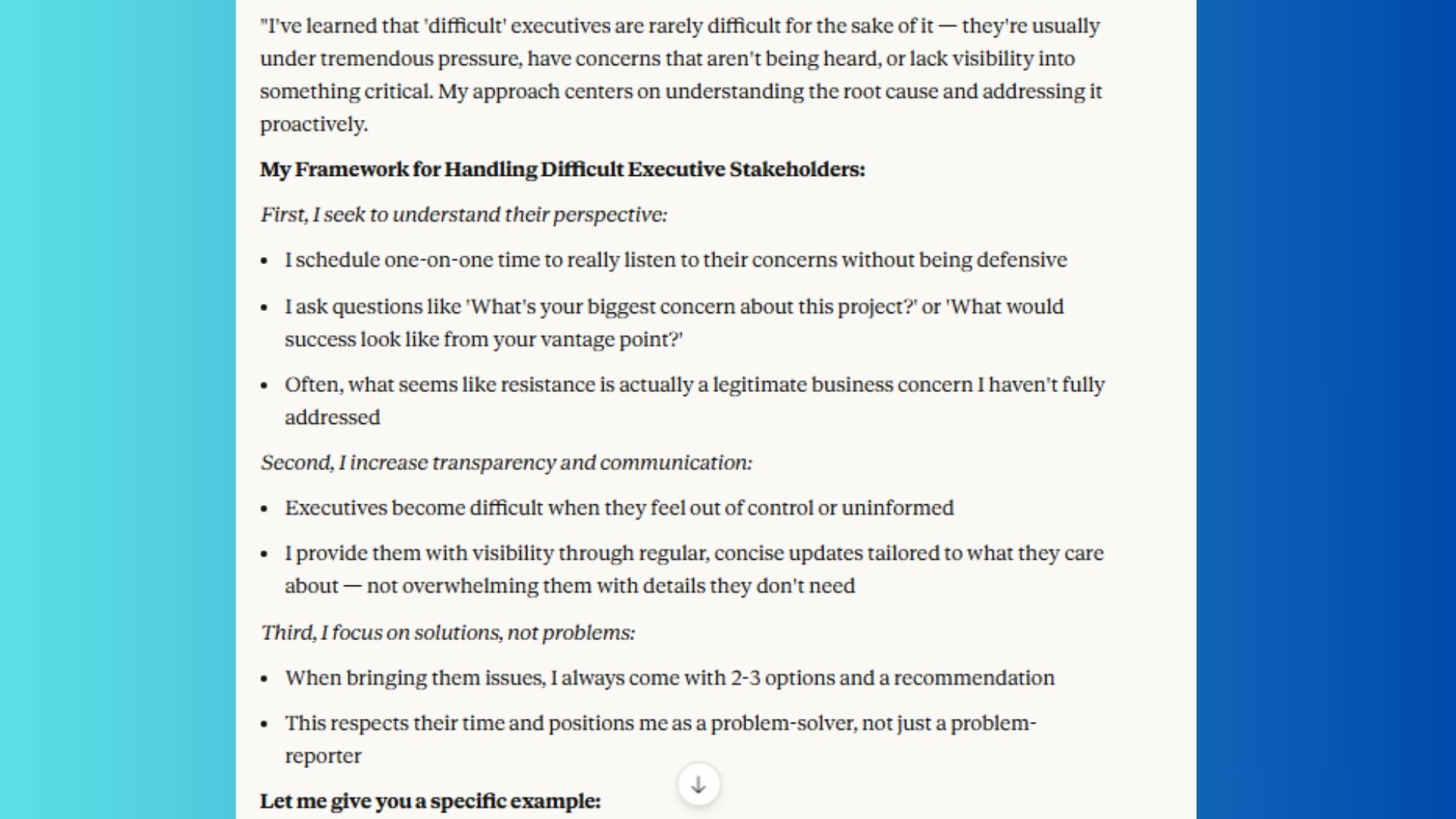
Prompt: “How do you handle difficult clients or stakeholders — especially those at the executive level?”
ChatGPT over-simplified and gave a generic example without significant stakes. It lacked the sophistication expected for handling executive-level conflicts
Gemini approached the question with excellent structure and a strong emphasis on moving from emotion to data.
Claude demonstrated the emotional intelligence, strategic thinking and executive presence required for someone interfacing with VP and Director level stakeholders.
Winner: Claude wins for immediately identifying the core truth about executive stakeholders: "they're rarely difficult for the sake of it — they're usually under tremendous pressure, have concerns that aren't being heard, or lack visibility into something critical." This shows deep understanding of executive psychology.
4. Balancing projects
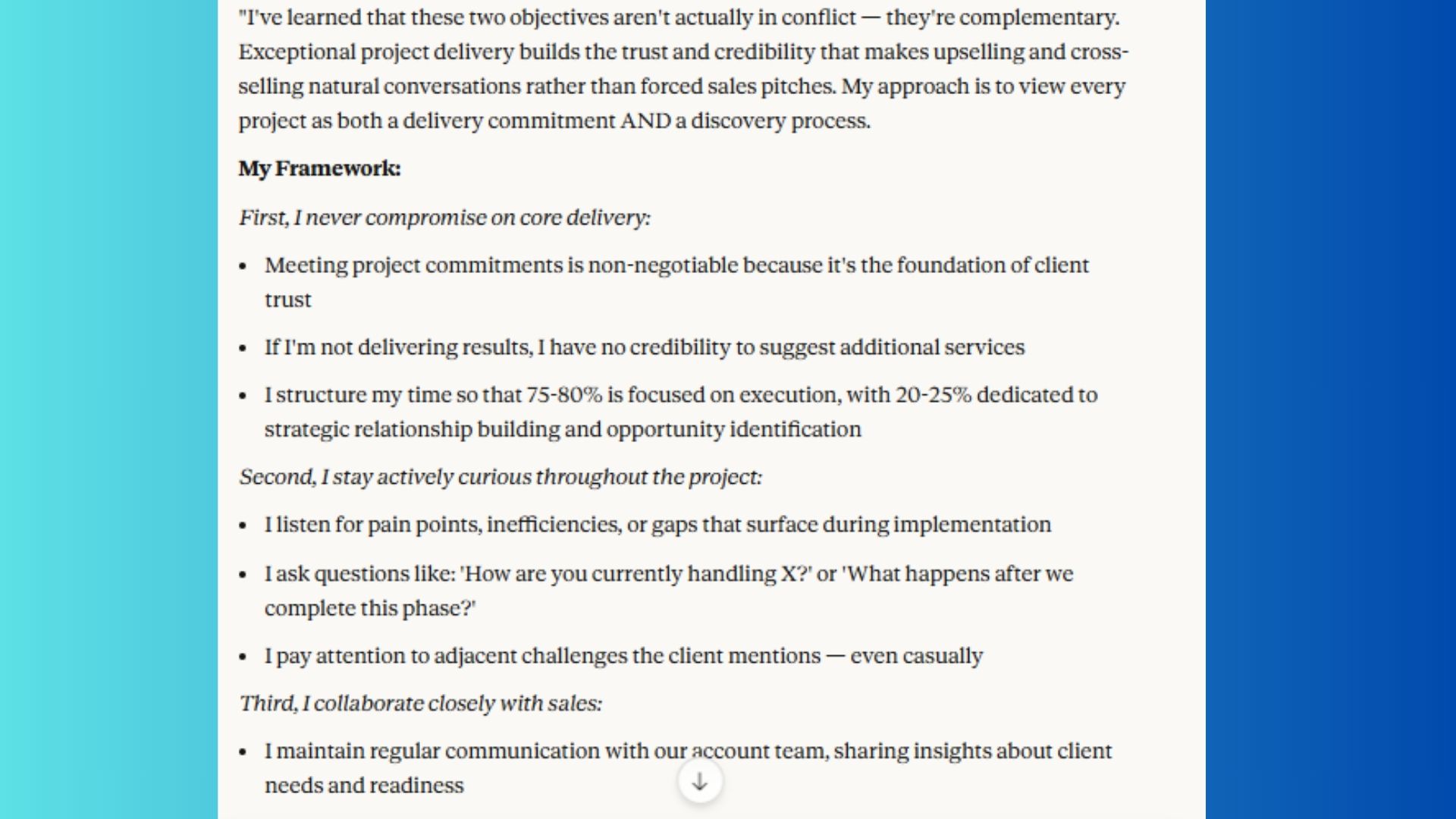
Prompt: “How do you balance delivering on current project goals while identifying opportunities to upsell or cross-sell?”
ChatGPT overly simplified its approach with a single anecdote without broader business impact. It lacked strategic framework and measurable outcomes.
Gemini showcased clear collaboration framework with sales but was less impactful than Claude’s response.
Claude exhibited the business acumen, strategic patience and commercial mindset that separates senior program managers from junior ones.
Winner: Claude wins for demonstrating a level of sophistication this role requires.
5. Project management
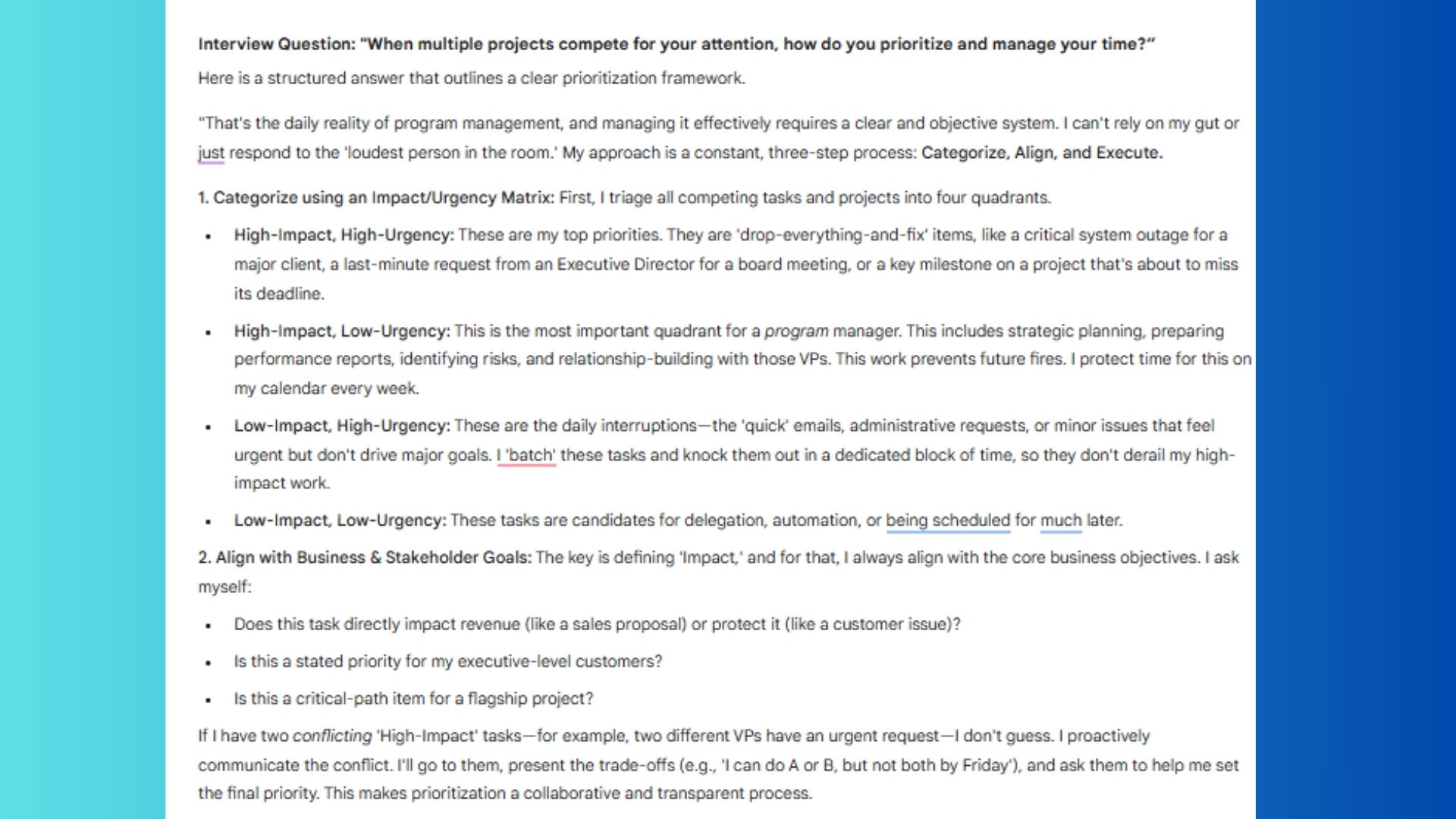
Prompt: “When multiple projects compete for your attention, how do you prioritize and manage your time?”
ChatGPT lacked strategic framework once again and per usual delivered an overly simplistic approach. Does it even want the job?
Gemini demonstrated a solid structured process with a good use of Impact/Urgency matrix.
Claude offered strategic prioritization and executive-level judgment but was overly verbose and often went off topic in an effort to be excessively thorough.
Winner: Gemini wins for the best and most balanced response.
6. Approach to data teams
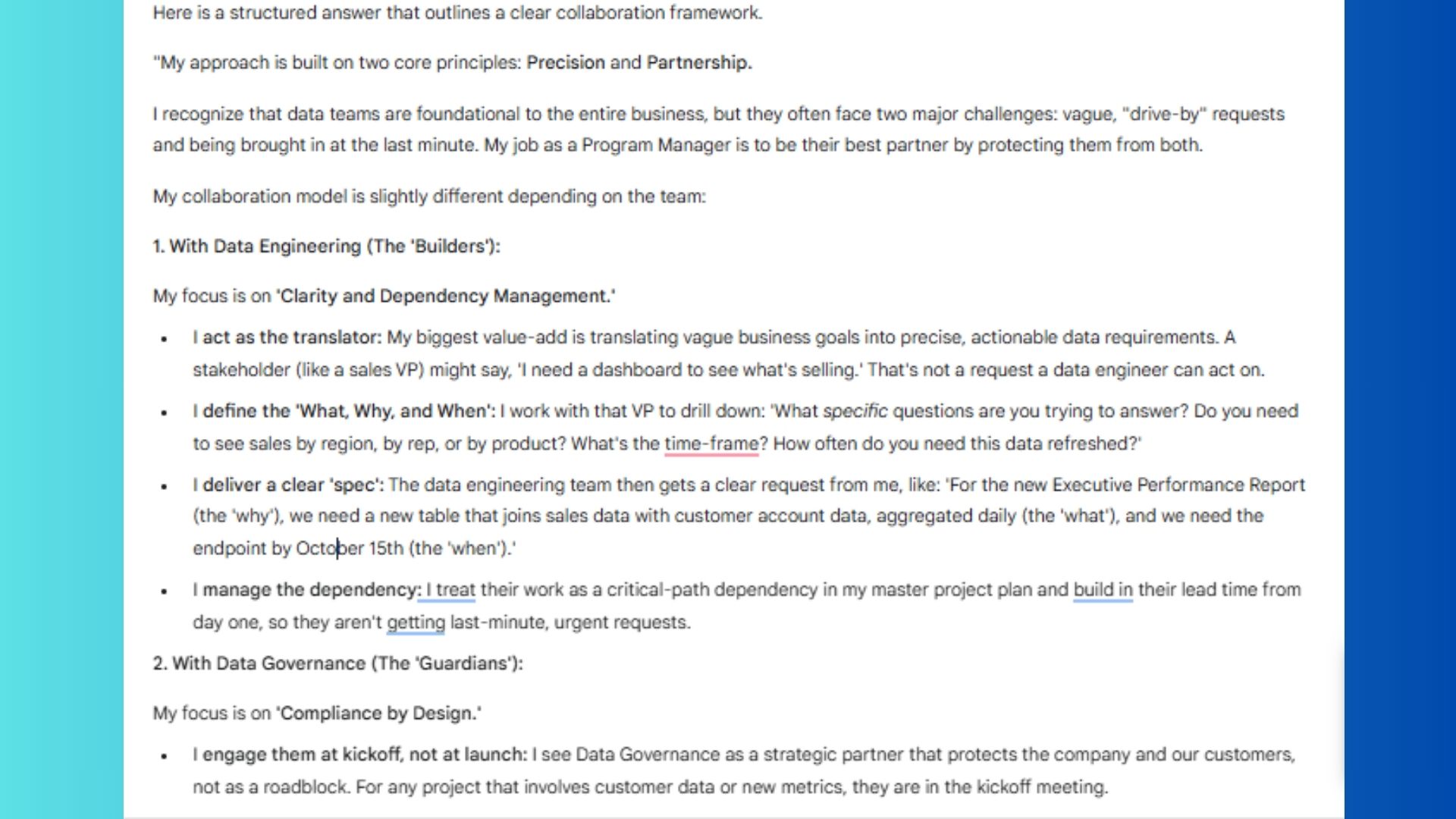
Prompt: “What’s your approach to working with data teams — for example, in Data Governance or Data Engineering projects?”
ChatGPT lacked the sophistication expected for data governance discussions.
Gemini answered in a way that demonstrated executive-level strategic thinking with perfect clarity.
Claude gave a textbook answer that felt disproportionately long and repetitive.
Winner: Gemini wins for executive-level strategic thinking and the use of language that resonates with both technical and non-technical stakeholders.
7. Determining what makes a program manager great
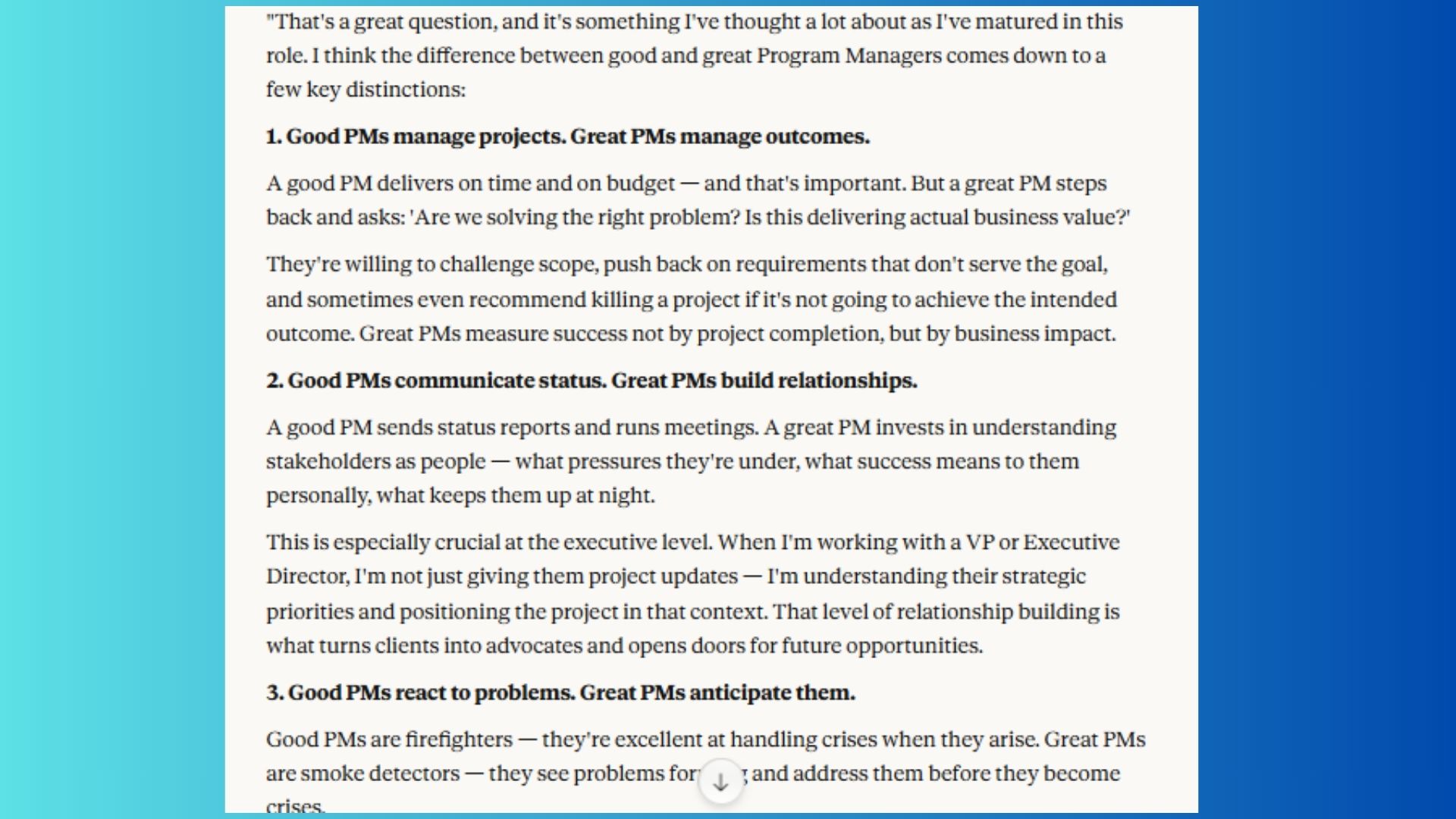
Prompt: “What do you think distinguishes a good Program Manager from a great one?”
ChatGPT highlighted important soft skills like communication, empathy and alignment. It was memorable for its poetic tone but was too generic and lacked specific examples, metrics or direct ties to the technical and business development aspects of the job.
Gemini directly addressed the core differentiators (Vision, Influence, Impact) with a focus on strategic partnership and driving business value.
Claude showed depth with seven-point framework that went beyond surface-level differences.
Winner: Claude wins for an answer that combined strategic insight with evidence-based results. It best captures the essence of what elevates a Program Manager from good to great in a way that resonates with the job's demands.
Verdict: Claude was hired
After seven rounds, Claude emerged as the strongest candidate overall. While Gemini was a close second, Claude was the one that blended strategic depth, emotional intelligence and business acumen in a way that most closely matched real-world expectations for a senior Program Manager.
Gemini’s precision and structure made it an impressive runner-up, while ChatGPT, though articulate, often fell short on strategy.
If this experiment proves anything, it’s that AI can already mimic middle-management logic, but leadership still requires a distinctly human mix of judgment, depth and empathy.
Follow Tom's Guide on Google News and add us as a preferred source to get our up-to-date news, analysis, and reviews in your feeds. Make sure to click the Follow button!
More from Tom's Guide
- I pitted Wikipedia against Elon Musk’s new Grokipedia — here’s which one gave the better answers
- I built 5 fun apps using Gemini AI Studio — including a cat meow translator
- How to vibe code with Gemini: 17 creative builds Google just revealed
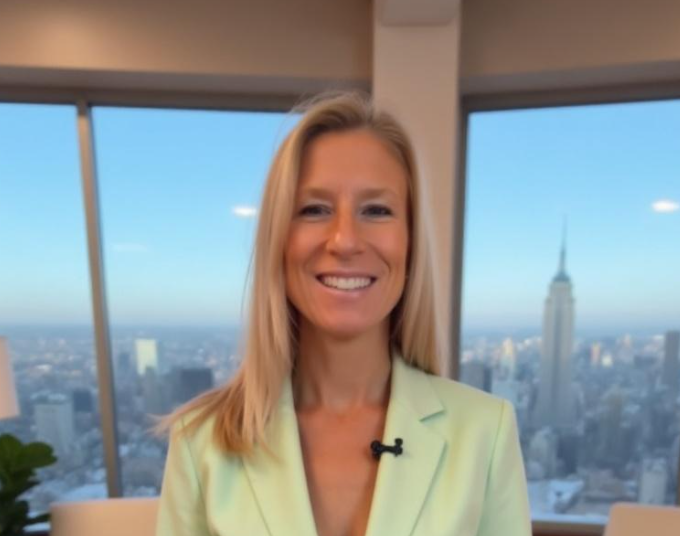
Amanda Caswell is an award-winning journalist, bestselling YA author, and one of today’s leading voices in AI and technology. A celebrated contributor to various news outlets, her sharp insights and relatable storytelling have earned her a loyal readership. Amanda’s work has been recognized with prestigious honors, including outstanding contribution to media.
Known for her ability to bring clarity to even the most complex topics, Amanda seamlessly blends innovation and creativity, inspiring readers to embrace the power of AI and emerging technologies. As a certified prompt engineer, she continues to push the boundaries of how humans and AI can work together.
Beyond her journalism career, Amanda is a long-distance runner and mom of three. She lives in New Jersey.
You must confirm your public display name before commenting
Please logout and then login again, you will then be prompted to enter your display name.
 Club Benefits
Club Benefits














